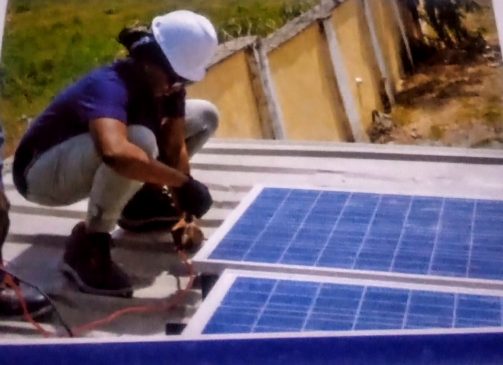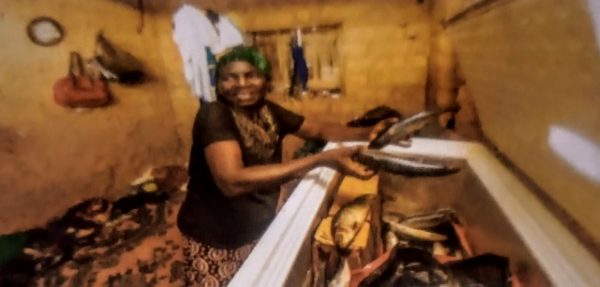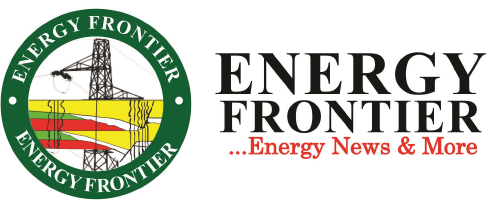Photo Left: Solar mini-grid in Gbamu Gbamu in Ogun State
Photo Right: Programme Steering Committee
Challenges
Despite its rich gas and oil reserves and the corresponding export earnings, Nigeria continues to suffer from chronic shortage of electric power. The slow performance of the public power sector has resulted in frequent power shortages, leaving large, medium and small enterprises as well as households without reliable electricity.
With 180 million inhabitants, the country only has an installed electricity generation capacity of 13, 700 Mega Watt (in comparison: South Africa generates 51Giga Watt), of which in 2018 only around 4,500 MW were available due to gas constraints, grid constraints and other technical issues.

Training on Solar PV installation
Renewable Energy, RE, and Energy Efficiency,EE, are still underutilized in Nigeria. Policy development, however, has been encouraging in the last years with approvals of the National Renewable Energy and Energy Efficiency policy , NREEEP, and the Vision 30:30: 30, which calls for the installation of 30 Gigawatt by 2030 with a share of 30 per cent renewables. Still around 55 per cent of the population do not have access to grid-connected electricity. In rural areas, the number goes up to even 75 per cent.
“In order to foster investment in the renewable energy and energy efficiency sector and increase the access to sustainable electricity, the European Union and the German Federal Ministry of Economic Cooperation and the Develeopment, BMZ, jointly funded the Nigerian Energy Support Programme , NESP, 2013. To the tune of 33 million Euro and implemented by the Deutsche Gesellschaft für Internationale Zusammenarbeit, GIZ, in collaboration with the Federal Ministry of Power”, said the head of Programme, NESP, Duke Benjamin.
Our Approach
“NESP 11 supports Nigeria in utilizing the potentials of energy efficiency, integrating renewable energy into the grid and further scaling rural electrification. The overarching aim is targeted at the provision of reliable, affordable and sustainable energy for Nigerian people. This includes provision of energy to disadvantaged parts of the population that have not had access to modern energy services before. NESP 11 implements a multi-level approach by combining advisory on energy policy, economy and technical knowledge for a wide range of stakeholders”, he added.
The NESP components are tasked with:
Electrification planning and data assessment as a basis for policy reviews and to provide private sector market intelligence, improving access to sustainable energy(on-and off-grid) through strengthening regulations and systems operations regarding the feed-in of large scale solar as well as providing 100,000 people in rural areas with solar power, enabling an environment for investment in RE/EE through energy efficiency measures in buildings and industries, access to finance and quality standards.
Impact and Figures
In the first phase (2013-2018), NESP reached more than 15, 000 people with solar- powered mini-grids that blend finance from public and private investors. Further, NESP supported the implementation of energy efficiency pilot projects in public and industry building which led to energy savings of 15 per cent. A solar water heating system in a school in Plateau State helps to increase energy efficiency by almost 84 per cent.
“At the start of NESP, there was no consideration of renewable energy and energy efficiency in laws regulations.by the end of the first phase, 11 measures such as the NREEP, a mini-grid regulation, a building energy efficiency code as well as an energy efficiency label for household appliances had been introduced.
Additionally, NESP provided training courses on renewable energy and energy efficiency, increasing vocational skills of more than 120 participants to encourage capacity development in the energy sector”, stressed Duke.

A Fish Vendor, Adebisi Esho and her solar powered Freezer
Adebisi Esho a fish vendor, is one the villagers in Gbamu Gbamu- Community – Ogun State, who has benefitted from the solar mini-grid project that was implemented with the support of NESP in 2017. Now, she enjoys 24-hour access to reliable electricity and saves more than N1000 per day on fuel costs.
The vendor of frozen fish and drinks said: “…the mini-grid is a welcome development as I am now able to run my freezer al night to ensure the fish is fresh and frozen before taking it to market. Now, there is adequate power to ensure that the fish in freezer stays frozen longer. With this power, I no longer have to buy expensive fuel for my business. The solar mini-grid is slowly transforming our community (Gbamu Gbamu) and we are happy, excited and know that the future is brighter”.





















